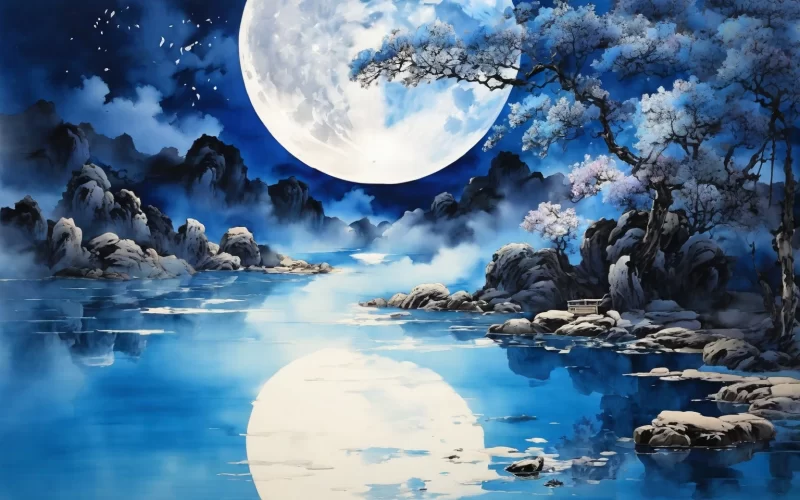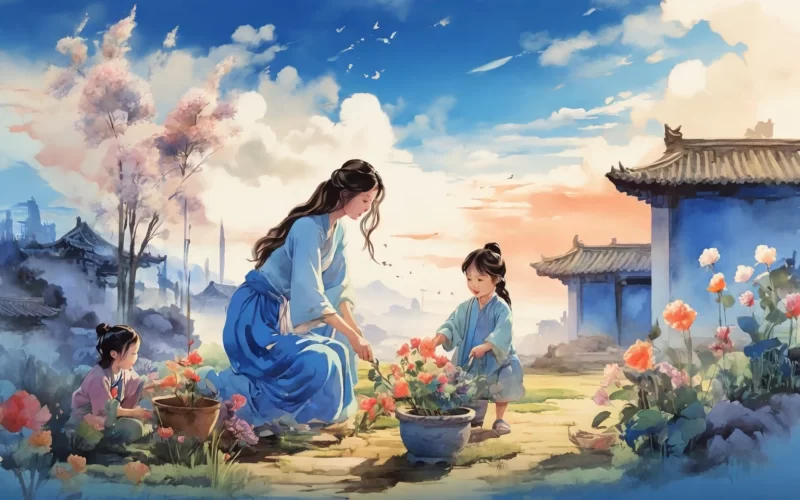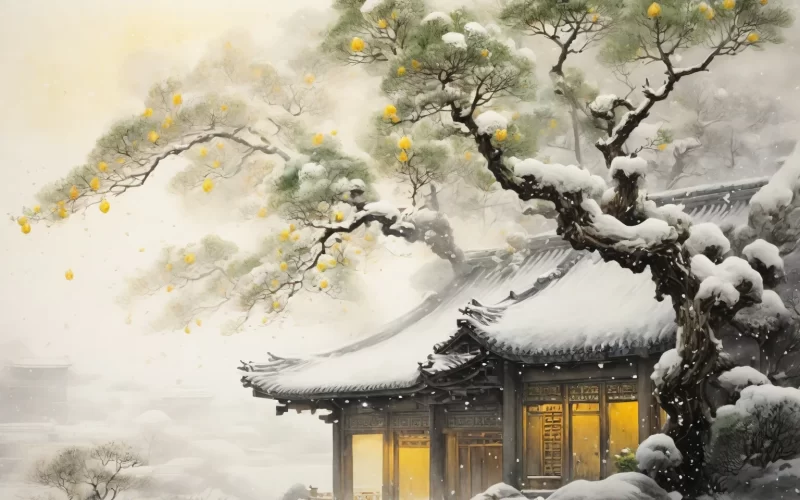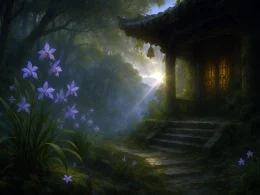How much delight in vernal hill?
Don't go back but enjoy your fill!
Drinking water, you drink moonbeams;
Plucking flowers, you pluck sweet dreams.
Happy, you would forget the hours;
About to go, you can't leave flowers.
Looking south where you hear the bell,
You'll find green bowers in green dell.
Original Poem
「春山夜月」
于良史
春山多胜事,赏玩夜忘归。
掬水月在手,弄花香满衣。
兴来无远近,欲去惜芳菲。
南望鸣钟处,楼台深翠微。
Interpretation
This poem was composed during the Tang Dynasty's golden age, when landscape poetry reached its zenith. Though historical records of Yu Liangshi are scarce, his work reveals a refined sensibility and profound communion with nature. The poem captures a spring night's mountain excursion, weaving delicate imagery with transcendent serenity to create a masterpiece that embodies the spiritual essence of Tang poetry. Through vivid depictions of natural beauty, it articulates the poet's liberation from worldly concerns and joyful immersion in wilderness - a perfect fusion of scene and sentiment, where every detail resonates with quiet profundity.
First Couplet: "春山多胜事,赏玩夜忘归。"
Chūn shān duō shèng shì, shǎngwán yè wàng guī.
The spring-clad mountains brim with wondrous sights,
So captivating that I forget night's fall.
The opening couplet establishes the poem's central tension between nature's allure and human temporality. "Brim with wondrous sights" suggests an inexhaustible plenitude that transcends ordinary perception, while "forget night's fall" reveals how aesthetic rapture dissolves temporal awareness. The poet's surrender to the moment transforms what might be mere sightseeing into a spiritual encounter, where the distinction between observer and landscape begins to blur.
Second Couplet: "掬水月在手,弄花香满衣。"
Jū shuǐ yuè zài shǒu, nòng huā xiāng mǎn yī.
Cupping clear stream, I hold the moon's bright gleam,
Toying with blooms, their scent imbues my sleeves.
These celebrated lines achieve alchemical transformation of sensory experience. The simple act of drinking becomes cosmic as water reflects the celestial ("hold the moon's bright gleam"), while playful interaction with flowers results in sartorial transfiguration ("their scent imbues my sleeves"). The poet's body becomes a medium where elemental and human realms interpenetrate - palms become vessels for celestial light, fabric absorbs vegetative essence. This tactile mysticism elevates physical sensation to spiritual communion.
Third Couplet: "兴来无远近,欲去惜芳菲。"
Xìng lái wú yuǎnjìn, yù qù xī fāngfēi.
When inspiration comes, all bounds dissolve,
Yet parting brings regret for blossoms fair.
Here the poem explores the paradox of aesthetic transcendence. "All bounds dissolve" describes the poet's ecstatic state where spatial constraints vanish, yet this liberation creates new attachments - the very beauty that enabled transcendence now makes departure painful. The couplet's structure enacts this tension: the first line's expansive freedom contrasts with the second's reluctant contraction, mirroring the oscillation between spiritual flight and earthly affection.
Fourth Couplet: "南望鸣钟处,楼台深翠微。"
Nán wàng míng zhōng chù, lóutái shēn cuìwēi.
Southward, where temple bells through mountains sound,
Pavilions float in jade-green haze profound.
The conclusion achieves sublime synthesis. The auditory image of distant bells ("temple bells through mountains sound") introduces temporal resonance into the visual landscape, while "jade-green haze" renders human structures insubstantial against nature's grandeur. This final vision dissolves categorical distinctions - architecture merges with topography, sound blends with mist, creating a composite image of enlightenment's elusive presence. The poem thus completes its movement from particular observation to universal contemplation, leaving the reader suspended between sensory immediacy and metaphysical wonder.
Holistic Appreciation
Spring Mountain Moonlit Night is a landscape poem that masterfully blends realism and lyricism. Centered on a nocturnal mountain excursion in spring, the poem paints a serene and exquisite scene through simple, natural language, employing an artful interplay of movement and stillness, tangible and intangible. The opening couplet expresses the joy of wandering; the middle lines convey intoxication in nature’s embrace; and the closing lines, with distant temple bells, mark the passage of time and the vastness of the wilderness. The poem unfolds like a scroll of mountain vistas—each step reveals new scenery, each line pulses with emotion.
Particularly celebrated is the couplet “Holding water, I cup the moon in my hands; / Playing with flowers, their fragrance fills my robes.” Beyond its strikingly original imagery, it embodies the poet’s immersion in natural beauty, reflecting a spiritual unity with the landscape. This couplet has been cherished through the ages.
Artistic Merits
- Unity of Self and Nature, Elevated Imagery: Lines like “cupping the moon” and “fragrance-filled robes” transform objective scenery into subjective experience, radiating sensuality and illustrating humanity’s intimate bond with nature.
- Fresh, Unadorned Language: The poem’s plain diction, free of artifice, creates vivid tableaus with remarkable immediacy.
- Seamless Structural Flow: The four couplets transition organically—from exhilaration to reluctant farewell, from close observation to distant contemplation—building emotional depth with architectural precision.
- Balance of Tangible and Ethereal: The bells and “emerald peaks,” though intangible, amplify the mountain’s secluded grandeur, serving as the poem’s transcendent climax.
Insights
Spring Mountain Moonlit Night reminds us that a poetic life need not clamor for attention; sometimes, a handful of clear water, a spray of blossoms, or a lone moon can awaken the purest joy and tranquility. In our fast-paced modern world, the poem invites us to slow down, commune with nature, and rediscover overlooked beauty. Through a spring night’s mountain wanderings, the poet rekindles our innate yearning for nature, serenity, and freedom—an enduring emblem of classical Chinese aesthetic ideals.
Poem translator
Xu Yuanchong(许渊冲)
About the poet
Yu Liangshi(于良史), a Tang dynasty poet, left behind only five extant poems in the Complete Tang Poems (Quan Tangshi). Despite this sparse legacy, he occupies a distinctive place in the poetic transition from the High Tang to the Mid-Tang period. Yin Fan, a contemporary critic, praised his work as "masterful in crafting poetic realms, exquisite in naturalness."












